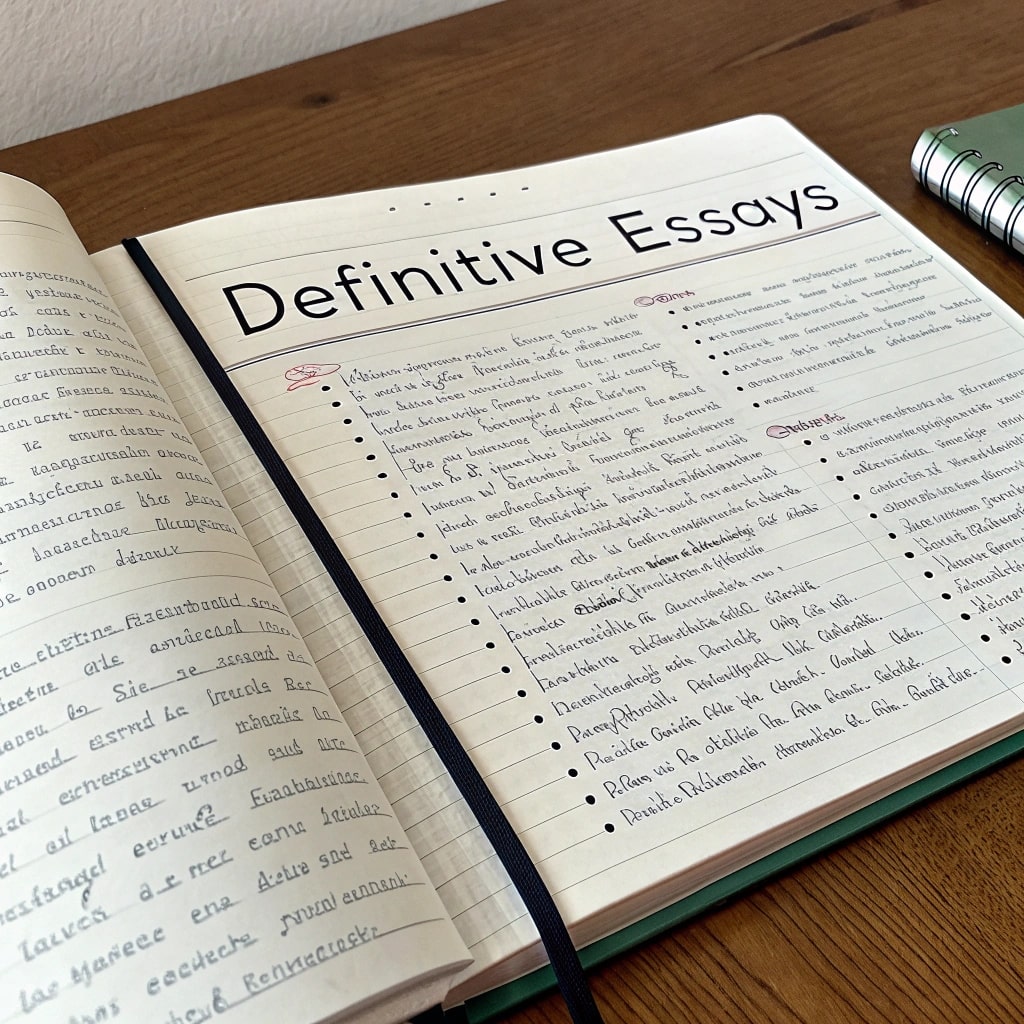How to Write a Definitive Essay: The Ultimate Guide for 2025

Writing a definitive essay is both an art and a science that requires careful planning, thorough research, and clear articulation of ideas. Whether you’re a high school student tackling your first major assignment or a graduate student completing advanced coursework, knowing how to write a definitive essay is an essential skill that will serve you throughout your academic journey and beyond. A definitive essay aims to be the final word on a subject—comprehensive, authoritative, and convincing. Unlike other essay types that might explore possibilities or present opinions, a definitive essay establishes facts and provides conclusive information on a topic.
In today’s competitive academic environment, mastering how to write a definitive essay can be the difference between average and exceptional work. This guide will walk you through every aspect of creating a standout definitive essay, from understanding its purpose to polishing your final draft.
What Is a Definitive Essay?
Before diving into the “how,” let’s clarify the “what.” A definitive essay is a comprehensive, authoritative piece of writing that thoroughly explores a topic and provides conclusive information backed by solid evidence. When learning how to write a definitive essay, it’s important to understand that these essays:
- Present complete information on a subject
- Offer authoritative analysis backed by credible sources
- Answer all potential questions about the topic
- Leave readers feeling informed and satisfied
Think of a definitive essay as the academic equivalent of a definitive guide—it should be the resource someone needs to fully understand a topic. The goal isn’t just to inform but to become the reference point for the subject matter.
How Definitive Essays Differ from Other Essay Types
Understanding how to write a definitive essay begins with recognizing how it differs from other common essay types:
| Essay Type | Primary Purpose | Key Characteristics |
|---|---|---|
| Definitive | To provide comprehensive, authoritative information | Thorough research, multiple perspectives, conclusive statements |
| Argumentative | To convince readers of a position | Strong thesis, counterarguments, persuasive language |
| Expository | To explain or describe | Clarity, objectivity, informational focus |
| Narrative | To tell a story | Personal experiences, chronology, descriptive language |
The definitive essay combines elements of research papers and expository essays but goes further in its commitment to comprehensive coverage and authoritative tone. When you understand how to write a definitive essay properly, you create something that stands as the ultimate resource on your chosen topic.
Essential Steps to Write a Definitive Essay
Learning how to write a definitive essay involves mastering several key steps. Let’s break them down:
1. Choose the Right Topic
Selecting an appropriate topic is the first crucial step in how to write a definitive essay. Your topic should be:
- Specific enough to cover thoroughly (avoid topics that are too broad)
- Complex enough to warrant detailed analysis
- Interesting enough to maintain your engagement
- Relevant to your course or assignment requirements
For example, instead of writing about “Climate Change” (too broad), narrow it to “The Impact of Climate Change on Coastal Farming in Florida.” This specificity allows for deeper analysis and more definitive conclusions.
If you’re struggling with topic selection, our expository essay guide offers additional tips on finding the right focus for academic writing.
2. Conduct Comprehensive Research
Once you’ve selected your topic, thorough research becomes the foundation of how to write a definitive essay effectively. Follow these research strategies:
- Consult diverse sources: academic journals, books, reputable websites, interviews, and primary documents
- Take detailed notes, including complete citation information
- Identify key authorities in the field and their perspectives
- Look for conflicting viewpoints to address in your essay
- Gather statistics, examples, and case studies to support your points
Remember that a definitive essay requires more extensive research than most other essay types. You’re aiming to become temporarily expert enough on the topic to speak with authority.
3. Create a Detailed Outline
With research in hand, mapping out your essay is the next step in how to write a definitive essay. A well-structured outline serves as your roadmap:
- Introduction with a clear thesis statement
- Main points organized logically (chronological, compare/contrast, cause/effect, etc.)
- Supporting evidence for each main point
- Counterarguments and their refutations
- Conclusion that synthesizes information and reinforces the definitive nature
Your outline should be detailed enough that someone else could potentially follow it to write a similar (though less personalized) essay.
4. Write a Compelling Introduction
The introduction sets the stage for your definitive essay. When learning how to write a definitive essay introduction, focus on:
- Opening with an attention-grabbing hook relevant to your topic
- Providing brief context about the subject’s importance
- Clearly stating your thesis—what definitive information or conclusion your essay will provide
- Offering a roadmap of the main sections to follow
A strong introduction signals to readers that they’re about to receive authoritative information from someone who knows how to write a definitive essay properly.
5. Develop Comprehensive Body Paragraphs
The body of your essay is where your research shines. Each paragraph should:
- Begin with a clear topic sentence
- Present evidence and analysis supporting your points
- Connect to your overall thesis
- Transition smoothly to the next paragraph
When mastering how to write a definitive essay, pay special attention to the depth of your analysis. Don’t just present facts—explain their significance, connect them to broader themes, and show why they matter.
6. Address Counterarguments
A truly definitive essay acknowledges and addresses opposing viewpoints. This demonstrates:
- Your comprehensive understanding of the topic
- Your intellectual honesty
- The strength of your position when contrasted with alternatives
When learning how to write a definitive essay, remember that addressing counterarguments actually strengthens your authority rather than undermining it.
7. Write a Conclusive Conclusion
Your conclusion should feel definitive. It should:
- Synthesize the main points rather than merely summarizing them
- Reinforce the comprehensive nature of your analysis
- Address the “so what?” question—why this information matters
- Leave readers with a sense of closure and complete understanding
Advanced Techniques for Writing a Definitive Essay
Once you’ve mastered the basics of how to write a definitive essay, consider these advanced techniques to elevate your work:
Establish Authority Through Language
The language you use significantly impacts how definitive your essay feels. Consider:
- Using confident, declarative statements rather than tentative language
- Avoiding unnecessary qualifiers (“sort of,” “kind of,” etc.)
- Employing precise terminology relevant to your field
- Balancing academic language with accessibility
For example, instead of writing “Climate change might be affecting coastal farming,” write “Climate change has demonstrably altered coastal farming practices through three key mechanisms.”
Need help refining your academic writing style? Our custom essay help services can provide personalized guidance.
Incorporate Visual Elements Where Appropriate
Some definitive essays benefit from visual elements that clarify complex information:
- Charts or graphs displaying statistical data
- Diagrams illustrating processes or relationships
- Tables comparing multiple factors
- Timelines showing historical progression
Visual elements should complement your written analysis, not replace it. When learning how to write a definitive essay, think of visuals as tools to enhance comprehension.
Use Structural Signposting
Guide your reader through your definitive essay with clear structural markers:
- Section headings and subheadings
- Transitional phrases between sections
- Summary statements at key junctures
- Reference points to earlier discussions when relevant
Good signposting helps readers navigate complex information and reinforces the organized, authoritative nature of your definitive essay.
Common Challenges When Writing a Definitive Essay
Even when you understand how to write a definitive essay, you may encounter these common challenges:
Maintaining Objectivity
A definitive essay should feel authoritative without being dogmatic. Balance:
- Presenting evidence fairly
- Acknowledging limitations in current knowledge
- Distinguishing between facts and interpretations
- Avoiding emotional appeals that undermine your authority
Remember that true authority comes from comprehensive understanding, not forceful assertion.
Avoiding Information Overload
While thoroughness is essential in how to write a definitive essay, overwhelming readers with excessive detail can be counterproductive. Use these strategies:
- Prioritize the most significant information
- Organize details under clear conceptual frameworks
- Use appendices for supplementary information when appropriate
- Consider what your specific audience needs to know
Struggling with organizing complex information? Our report writing service specializes in structuring detailed content effectively.
Integrating Multiple Perspectives
A truly definitive essay incorporates diverse viewpoints. To do this effectively:
- Present competing theories fairly
- Identify points of consensus among experts
- Explain disagreements and their bases
- Synthesize perspectives where possible
This multi-faceted approach demonstrates your comprehensive grasp of the subject matter.
Essential Tips for Polishing Your Definitive Essay
The final stage in how to write a definitive essay involves refining your work:
Revise for Clarity and Coherence
Review your essay with these questions in mind:
- Does each paragraph connect clearly to your thesis?
- Do your arguments progress logically?
- Have you eliminated redundancies and tangents?
- Are complex ideas explained in accessible language?
Edit for Precision and Authority
Strengthen your writing by:
- Replacing vague terms with specific ones
- Eliminating unnecessary qualifiers
- Ensuring consistent terminology throughout
- Checking that conclusions follow logically from evidence
Perfect Your Citations
Citations aren’t just about avoiding plagiarism—they demonstrate the thoroughness of your research:
- Follow the appropriate citation style meticulously
- Include a diverse range of credible sources
- Cite primary sources where possible
- Ensure your bibliography is comprehensive and correctly formatted
If you’re working on a more extensive project, our professional capstone project help can assist with citation management and other technical aspects.
Examples of Effective Definitive Essays
To truly understand how to write a definitive essay, examining successful examples can be illuminating:
Academic Examples
- “The Definitive Analysis of Early Medieval Trading Networks” (Journal of Historical Economics)
- “Climate Change 2025: Comprehensive Assessment of Global Impacts” (International Climate Review)
Student Examples
- “The Evolution of Artificial Intelligence: A Definitive Timeline” (Award-winning undergraduate thesis)
- “Sustainable Urban Planning: Definitive Practices for Growing Cities” (Graduate-level capstone project)
What makes these examples stand out is their comprehensive coverage, authoritative tone, meticulous research, and clear organization—all key elements in how to write a definitive essay.
When to Seek Professional Help
Even with a solid understanding of how to write a definitive essay, some situations warrant professional assistance:
- When your topic requires specialized knowledge
- When you’re facing tight deadlines
- When the stakes are particularly high (like scholarship essays or capstone projects)
- When you need objective feedback on your approach
At Elite Researchers, our writing services provide expert guidance at every stage of the definitive essay process. For specialized projects like scholarship applications, our scholarship essay writing service offers targeted assistance.
Applying Definitive Essay Skills to Other Projects
The skills you develop learning how to write a definitive essay transfer well to other academic and professional tasks:
- Research reports benefit from the comprehensive approach
- Policy papers require similar evidence-based authority
- Business proposals need the same careful attention to counterarguments
- Technical documentation relies on clear explanations of complex topics
Many students find that mastering how to write a definitive essay improves their performance across all written assignments. For help with specialized projects, our project writing services can adapt these principles to your specific needs.
Learning how to write a definitive essay is a valuable investment in your academic and professional future. The skills involved—thorough research, clear organization, authoritative presentation, and comprehensive analysis—serve you well beyond the classroom. By following the steps and strategies outlined in this guide, you’ll be equipped to create essays that don’t just meet requirements but stand as definitive resources on their topics.
Remember that becoming proficient at how to write a definitive essay takes practice. Each essay you write strengthens your abilities and deepens your understanding of effective academic writing. Whether you’re tackling your first college assignment or preparing advanced scholarly work, the principles remain the same: be thorough, be clear, be authoritative, and always support your statements with solid evidence.
For additional guidance on academic writing, explore our comprehensive writing resources or check out our recent article on incorporating climate change research into academic papers.
FAQs About How to Write a Definitive Essay
Q: How long should a definitive essay be?
A: While length requirements vary by assignment, definitive essays typically range from 2,000-5,000 words. The key is comprehensive coverage rather than meeting a specific word count.
Q: How many sources should I use for a definitive essay?
A: A truly definitive essay typically references 15-25 sources for undergraduate work and 30+ for graduate-level papers. Quality and diversity of sources matter more than quantity.
Q: Can a definitive essay include personal opinions?
A: While a definitive essay should be primarily evidence-based, expert interpretations (including your own well-supported conclusions) have their place. Just ensure opinions are clearly identified as such and supported by evidence.
Q: How is a definitive essay different from a research paper?
A: While both require thorough research, a definitive essay aims to be the authoritative source on a topic, offering conclusive information. A research paper might focus more on methodology and contributing new knowledge to the field.
Q: What’s the most common mistake when writing a definitive essay?
A: The most common pitfall is insufficient research leading to incomplete coverage of the topic. Remember that a definitive essay should address all major aspects and perspectives on your subject.



0 Comments